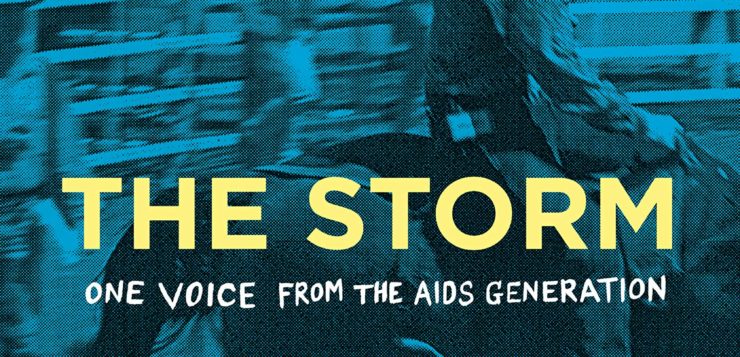 THE STORM
THE STORM
One Voice from the AIDS Generation
by Christopher Zyda
Rare Bird Books. 260 pages, $26.
FIRST LOVE swirls at the center of Christopher Zyda’s memoir, The Storm, followed in short order by illness and death. The book recounts the fifteen-year period from 1983 to 1998, during which the promising UCLA English literature major who had “set my career sights on writing in Hollywood” meets and falls in love with 33-year-old Stephen, “a muscular man with brown hair, piercing blue eyes, and a beautiful smile.” Stephen, a Yale graduate and lawyer, soon falls mysteriously ill, and Zyda is forced to set aside artistic dreams for practical considerations, enrolling in business school in order to get a job with a salary large enough to cover the dying man’s mounting medical bills.
In the preface, Zyda discloses the rules he’s playing by: real first names “unless they are villains. Villains are not referred to by their names at all, only by their roles in my story.” These include Stephen’s parents, who swoop in after his death, accusing Zyda of being a “freeloader” who killed their son while trying to wrest control of the house the men once shared. A long court battle ensues, and Zyda’s account, refuting their claims one by one, reads like a deposition. (A long career as a corporate executive might have conditioned this well-armed response.)
Despite a rigid organizing structure—the chapter titles reflect the writer’s changing moods: “Sun,” “Clouds,” “Rain,” etc.—Zyda has a lot of loose bits shoved in here and there, such as his complicated family dynamics (including his relationship with his sister, Joan, who’s fired from her job as a newspaper journalist for being a lesbian), and the character of a gigolo friend, whose promiscuity seems set up to serve as a counterpoint to the author’s own “lifelong hypochondriac and germaphobe tendencies.” However, he soon drops the gigolo from the narrative. “And where in the hell was my friend Bryn?” he asks in a later chapter, as if he’s been impatiently tracking Bryn’s whereabouts rather than suddenly remembering he was supposed to be in the story.

By his own admission, Zyda has “painstakingly, and quite painfully, recreated this period of my life” such that his control-freak tendencies come to the surface. And lest readers begin to form their own impressions, the author provides his own interpretations, complete with unnecessary period details, cumbersome footnotes, and even a soundtrack comprised of “the best songs from the playlist of my life.” When Stephen is hospitalized, Zyda writes: “I was devastated. ‘Where Do Broken Hearts Go,’ Whitney Houston’s emotional 1988 ballad, underscored this horrible moment of my life.” The pop culture reference seems retrofitted to capture the moment but brought this reader out of the moment.
The dialogue is often wooden. “You are thirty-four and I am twenty-two. We are in such different places in our lives,” Zyda remembers his younger self confessing to Stephen. Elsewhere, the speeches are overwrought. Confronting Stephen’s ineffective medical team, an impassioned Zyda all but leaps onto the desk to declare: “Once upon a time, I briefly considered becoming a medical doctor myself because I admired how doctors helped people. I like helping people, too. I admire the 2,500-year-old Hippocratic Oath: ‘First, do no harm.’”
Only occasionally does real feeling seep through. In a powerful moment, a stunned Zyda, alone for the first time after Stephen’s death, realizes how quickly life moves on: “Stephen’s presence in our home started to fade, too. I could feel it. To try to hold on to what I was losing, I went into our clothes closet and smelled some of his clothes that he hadn’t worn for months. I clung on to Stephen through the faint drift of him that remained in his clothing.”
The Storm would have benefitted from more moments like this, where Zyda lets the important, real, remembered feelings rise to the surface. Rather than linger in the rich, ruminative realm of his emotions, he largely sticks to the facts as he’s remembered (or recreated) them. He’s so intent on delivering a blow-by-blow account that the emotional truth gets pummeled flat. We know it’s a sad story; we just don’t feel the sadness.
____________________________________________________
Michael Quinn reviews books for Publishers Weekly, for literary journals, and for the Brooklyn newspaper The Red Hook Star-Revue.






